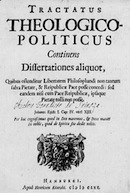
Source: Theologico-Political Treatise - Chapter V - of the ceremonial law
Spinoza's Chapter 5– on Christian rites - briefly (Page 5)

Spinoza turns to Christian rites such as baptism, festivals and public prayers and wonders if they were introduced by Christ or his apostles. If they were, which he doubts, their purpose was to establish a church and they had nothing to do with blessedness nor did they have any sanctity in themselves.
Although these ceremonies had nothing to do with governance they were used to preserve a certain society. Spinoza points out that hermits or citizens of Japan abstain from such rites and can, nevertheless, live in a state of blessedness.
Spinoza's words: I am anxious to proceed to my next proposition. I will now, therefore, pass on to what persons are bound to believe in the narratives contained in Scripture, and how far they are so bound by them.
Comment:
In light of Spinoza's statement that religious rites have nothing to do with sanctity it is no wonder that this book was banned. The book was written in Latin in the hope that it would pass in the relatively liberal Dutch Free Republic but the Christian religion was too deeply entrenched in government to allow such a opinion to remain in print even if the ordinary citizen couldn't read it. The violent reaction told Spinoza that it was too dangerous to publish his Ethics.